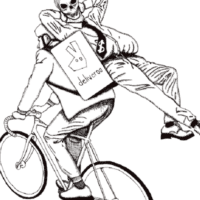-
Speaking the truth
Cornel West and Deborah Chasman discuss the disproportionately white publishing world, the responsibilities and burdens of public life, and the predicament of black intellectuals today.
-
Ronnie Kasrils on South African election
As the curate said, assessing a none-too-fresh boiled egg at breakfast: ‘It was good in parts.’
-
Media stenography turns beheaded Saudi protesters into ‘terrorism’
All three outlets also added gratuitous details about the attack in Sri Lanka and/or other ISIS-related attacks–attacks that there’s no suggestion any of the defendants were connected to. In fact, most of these defendants were arrested before ISIS existed. And a majority of those killed, being Shiites, would be viewed by ISIS as heretics.
-
We are the shadow-ghosts, creeping back as the camp fires burn low
Professor Sandra Díaz, who teaches in Argentina’s National University of Cordoba and is the co-chair of the IPBES report, said that although bio-diversity and eco-diversity are ‘declining fast’, ‘we still have the means to ensure a sustainable future for people and the planet’.
-
Colored Property & State Debt with David Freund
In this episode, we talk with David Freund, associate professor of history at the University of Maryland. David is the author of Colored Property: State Policy and White Racial Politics in Suburban America, an award-winning book that tracks how the language of racial exclusion was re-coded in terms of markets, property, and citizenship in the post-World War II era.
-
Cuban “troops” saving lives in Venezuela
Cubans are truly committed to the principle of sovereignty, we are protective of our independence, and we would never do to others what we would not allow to be done to ourselves.
-
Trump continues Obama’s war on whistleblowers, arrests another alleged Intercept source
This outrageous explosion of watchlisting — of monitoring people and racking and stacking them on lists, assigning them numbers, assigning them ‘baseball cards,’ assigning them death sentences without notice, on a worldwide battlefield — it was, from the very first instance, wrong.
-
We have stolen his land. Now we must steal his limb
When the late South African artist Tito Zungu wanted to depict the world of the migrant labourer, he settled on the envelope. It was by infrequent letters that the migrant would be able to be in touch with family – letters dictated to professional letter writers at one end, which would be read out by professional letter readers at the other.
-
The Atlantic illustrates everything that’s wrong with media coverage of Venezuela sanctions
“Trump’s Venezuela Policy: Slow Suffocation,” an Atlantic report (4/17/19) by Uri Friedman and Kathy Gilsinan, passed up a rich opportunity to expose the humanitarian pretexts for economic intervention, and instead exhibited the worst tendencies of corporate media coverage of U.S. policy in Latin Ame
-
“Color” revolution USA
The U.S. press has routinely abused, disrespected and lied about Black, brown and yellow peoples and their heads of state, and now subjects its own top political figures to the same treatment.
-
Washington’s hybrid war on Venezuela – a very 21st-century attempt at regime change
Rather than carry out conventional war, over recent months U.S. officials have sought to promote internal divisions, sabotage, and economic collapse within Venezuela. Here’s the full story of Washington’s hybrid war on the country.
-
Tricontinental Briefing No 1: Canadian mining companies
Introduction Of the world’s mining companies, 60% are headquartered in Canada. In February 2019, 216 companies were listed on the Toronto Stock Exchange (TSX) and 961 companies were listed on the TSX-Venture Exchange (TSXV). Mining accounts for 53% of the composite index. This kind of industry dominance suggests that investors trust the stability of the […]
-
City of Segregation, One Hundred Years of Struggle for Housing in Los Angeles
Andrea Gibbons’ history of the battle for equal housing in LA uncovers the intensity and injustice of segregation, which remains a highly visible aspect of US cities, finds Adam Tomes
-
Precarious work: a Marxist explanation
The casualisation of work is no aberration of capitalism. It is the logical outcome of a system based on profit. Precarious work is the product of processes within capitalism that Karl Marx described over 150 years ago.
-
It’s only a coup if the U.S. Government says so
Media side with Trump cronies rather than common sense in labeling coup a ‘protest’.
-
The racist dawn of capitalism
The centrality of slavery to capitalism is not new, as any serious student of WEB Dubois is aware.
-
Racism & imperial anxiety: U.S. vs Huawei
U.S. political opinion against China has two solid bases. The first is the longstanding racist and protectionist sentiment in the white working class; the second is a more recent anxiety about China’s economic prowess in America’s ruling elite.
-
Venezuelan Government announces arrests over electrical blackouts
The government issued an arrest warrant request for the ex-security chief of the Guri Complex, who allegedly fled to the US following the March blackouts.
-
Eight Years After: No End in Sight for Clearing the Fukushima Nuclear Disaster
The most critical problem is that three reactors in the Fukushima Daiichi nuclear power plant had been damaged and the 250 tons of more than 1600 spent fuel rods were “reckoned” to have fallen to the bottom of the reactor vessel after having melted at high temperatures. The radiation level there was too high for humans to possibly come close, let alone remove the molten nuclear residue.
-
Solidarity with Venezuela now! Protect the embassy
We are writing to you from inside the Venezuelan embassy in Washington, DC where we are taking action against a U.S. coup of the independent and sovereign Bolivarian Republican of Venezuela. The Embassy Protection Collective (Colectivos Por La Paz) is here with the permission of the Venezuelan government to show our solidarity with the Venezuelan people. The upcoming week will be a critical one, as we explain below.




















